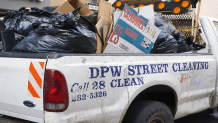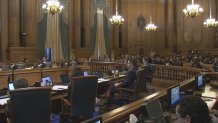San Francisco's embattled street-cleaning crew is caught up in yet another mess. An NBC Bay Area investigation reveals Public Works employees still appear to be dangerously overloading their vehicles with garbage, despite orders from state safety investigators to end the practice.
Top leadership within Public Works vowed to make immediate changes back in February, following an NBC Bay Area report that exposed serious safety violations. Just days after that report aired, investigators with Cal/Osha cited the department for "overloading...street-cleaning trucks." Soon after, a Public Works spokesperson said new safety training sessions were held, where workers were told to never stack garbage above the sides of their pickup trucks. Recent surveillance by the Investigative Unit, however, shows dozens of vehicles carrying large mounds of unsecured trash, piled well above the walls of the trucks.

SF Among California's Most Dangerous Cities for Commuters
Traffic-related accidents leave about 600 people seriously injured each year in San Francisco. The city is considered one of the most dangerous in the state for commuters, according to the California Office of Traffic Safety. In fact, traffic-related accidents have killed at least 12 people so far this year.
Mayor London Breed recently ordered police to “increase enforcement against dangerous traffic behavior,” however, NBC Bay Area has learned the city’s own fleet of vehicles has been violating safety law for years, putting drivers, bikers, and pedestrians at risk.
“There is a chance that they could kill somebody, hurt somebody.” said James Long, a veteran Public Works driver.
Local
Long used to haul trash for the city’s street-cleaning crew and said the department’s vehicles are dangerously overloaded “on a daily basis.”
Public Works picks up an average of 133,000 pounds of garbage each day. NBC Bay Area’s recent investigation exposed how the agency’s vehicles often navigate through San Francisco while carrying large piles of unsecured trash, which violates the city’s own safety rules and state law.
SFPD Has Yet to Cite Street-Cleaning Crew, Despite Repeated Violations
San Francisco police officers, however, have never ticketed a street cleaning vehicle, according to Public Works. In fact, officers have been spotted packing even more junk into already overloaded trucks. Despite submitting repeated interview requests, NBC Bay Area was told San Francisco Police Chief Bill Scott would be “unavailable” to comment.
107 Street-Cleaning Trucks Exceed Weight Safety Limits
City records, obtained and analyzed by the Investigative Unit, revealed 605 street-cleaning vehicles were overweight last year, exceeding safety limits. Three months after delivering those documents, however, Public Works provided what it described as more precise records, which listed new weight limits for 134 of its 169 street-cleaning vehicles. The new documents reflected 107 overweight vehicles during that same nine-month time period.
Public Works is quick to note those violations are among roughly 29,000 trips to the dump. Each overweight vehicle is considered a hazard since drivers can encounter difficulties when attempting to slow down or stop. The risk is only compounded when vehicles commute though densely populated sections of downtown San Francisco. City leaders recently launched their own safety probe and are scheduled to hold a public hearing on the issue at City Hall on May 23.

“I don't want to be part of a system where we could've prevented something, and something really fatal happened to someone,” said Norman Yee, president of the San Francisco Board of Supervisors.
Yee, who said he was first alerted to the problem after watching a recent NBC Bay Area investigation, will lead the safety hearing. If lawmakers aren’t satisfied with what they hear, they have the power to order changes within Public Works and can also schedule follow-up hearings to monitor the department’s progress.
“There needs to be improvement,” he said. “I think somebody could get hurt.”
Yee is expected to question the top two officials at the helm of Public Works – Director Muhammed Nuru and Deputy Director Larry Stringer.
“What I'm worrying about is the potential at this point that something can happen in terms of causing a bad collision or some sort or a debris flying off a truck,” Yee said.
Yee says he was especially concerned when he learned Nuru was unaware of state safety laws governing his fleet of city vehicles.
“Wait a minute -- how can you not know about this, you know, these regulations,” Yee said after viewing the NBC Bay Area interview with Nuru last February.
“I think safety is the number one priority at this department," Nuru said during the interview, adding, “You know, we haven’t had any violations. We haven’t had any problems.”
Just four days after that interview aired, state investigators with Cal/OSHA cited Public Works for the “unsafe condition of overloading … street-cleaning trucks” as well as “unsafe or unhealthy conditions, work practices, and work procedures”.
In addition to noting overloaded vehicles, Cal/OSHA also noted clogged drains at a Public Works’ truck washing station, which forced city employees to wade through standing water filled with used syringes.
“We have to make sure that not only are the people who are working safe, but, you know, the general public is safe as we try and address the challenges with keeping our streets clean,” Mayor Breed said. “The fact is, there hasn't been really any reported incidents as it relates to this particular issue. I'm focused on making sure that we keep our streets clean.”
When asked what was being done to make sure it doesn't happen again, Breed said, “It's being done as we speak.”
On the streets, however, it doesn’t appear much has changed. NBC Bay Area recently visited the city dump again and watched as more than 30 trucks drove in without any of its trash covered. Nearly all of the vehicles had garbage piled above the sides of the truck.
The Public Works Department told the Investigative Unit it now plans to retrofit its trash trucks with tarps that would secure garbage and other cargo. The plan, however, would likely take more than a year and roughly half a million dollars to complete. The department also said it conducted new training sessions to educate street-cleaning employees on proper safety measures and prevent overloading. The department, however, could not provide specific dates as to when those training sessions were held, nor could the agency specify how many employees attended.
______________________________________
Need to contact our Investigative Unit?
• You can remain anonymous
• 1-888-996-TIPS
______________________________________
.full-width .embed, .full-width .embedded.cm.embed{ text-align:left; }
Watch the entire series of this NBC Bay Area investigation:
- Part 1: Dangerous Mix of Trash, Needles, Feces Found in Downtown SF
- Part 2: Investigation into SF's Diseased Streets Goes Viral
- Part 3: SF Man Steps on Hypodermic Needle, Demands Action
- Part 4: San Francisco's 'Clean Streets' Plan Gets Messy
- Part 5: Empty Shops Rising in San Francisco, 'Dirty Streets' Partly to Blame
- Part 6: SF Mayor Vows to Veto $1.1 Million 'Street Cleaning' Plan
- Part 7: San Francisco's $65 million 'Street Cleaning' Budget Raises Concerns
- Part 8: SF Mayor Targets Dirty Streets with $12.8 Million Cleanup Plan
- Part 9: SF Prepares to Open Nation's First Supervised Injection Center
- Part 10: SF's "Dirty Streets" Scare Off Long-time Convention
- Part 11: SF Paid Firm $400k for Data Claiming City is Nearly Spotless
- Part 12: SF Mayor says City is Cleaner Under Her Administration, Despite Rising Complaints
- Part 13: San Francisco Sidewalks Graffitied with what Looks Like Feces
- Part 14: How Do You Picture San Francisco?
- Part 15: San Francisco's Street-Cleaning Trucks Overloaded, Unsecured
- Part 16: State Investigators Question Employees at SF Public Works
- Part 17: SF Public Works Fined for Safety Violations
- Part 18: SF to Investigate Safety Concerns Inside City's Street-Cleaning Program
- Part 19: SF Street-Cleaning Crew Still Overloading Trash Trucks



